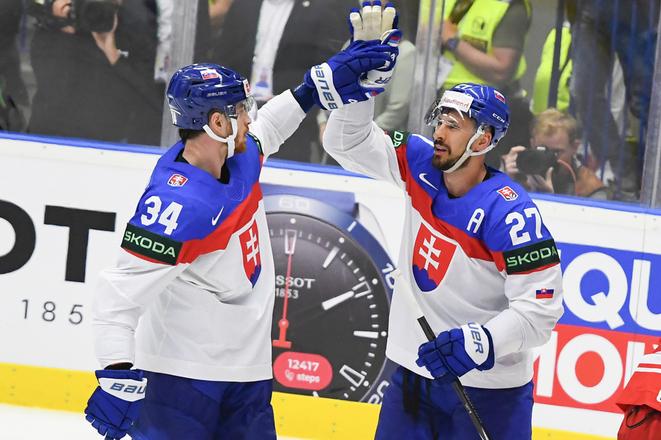(While this article was originally published in 2002, the proximity of VE day and hockey is especially poignant again this year with the hockey World Championships currently taking place in Czechia. Language is also still the same 22 years later. -ed.)
Almost 60 years after the end of the Second World War, Victory in Europe (VE) day on May 8 felt less like a commemoration of the defeat of Nazism than a celebration of the Slovak hockey team's narrow victory (víťazstvo) over Canada the night before.
English natives would describe the game, a quarterfinal match at the World Hockey Championships in Sweden, as a come-from-behind 3-2 victory for the scrappy (bojachtivý) Slovaks. But in Slovak, with far greater economy, you would say Slovensko zdolalo Kanadu, zdolať meaning to overcome, from the preposition zdola, below or from beneath.
Such a narrow (tesné) víťazstvo could not be described as a porážka (a whipping, hiding or thrashing), but you could certainly use the verbs vyhrať or zvíťaziť (followed by the preposition nad, over) to describe what Slovakia did to Canada. The difference between vyhrať and zvíťaziť is that the latter is more assertive or pompous, meaning to triumph rather than just plain win. The verb vyhrávať is used to describe an uncompleted action, and is what you ask (vyhrávame?) when you join the game late and want to know the score.
If you are Canadian, on the other hand, prehrali sme (we lost). While it was not a bad prehra, given that Canada had been expected to progress beyond the quarterfinals it could be seen as a porážka of sorts. Dali nám debakel, you could say (lit. they gave us a debacle); dali nám nafrak, dali nám na hubu (they socked it to us).
But back to VE day, and the Slovak take on winning and losing, it is interesting how quickly hockey has again become the national sport after the terrible disappointment of Slovakia's performance at the Salt Lake Winter Olympics. Grown men actually cancel meetings or walk out of bars to be home in time for the games. The streets today are quieter than they usually are on a holiday, perhaps because those same men walked back into the bars after last night's match to celebrate the great víťazstvo.
It is interesting that the verb hrať, to play, plays such a major role in Slovak words for winning and losing. As if Slovakia remained a country where the game was more important than the outcome, where nie je dôležité zvíťaziť, ale zúčastniť sa (taking part is more important than winning), and which had never heard US football coach Vince Lombardi's line that winning is not the most important thing, it is the only thing.
For another thing, the English word loser has a psychic impact far beyond its literal meaning. It carries all the West's messed-up thinking about winning and losing, the conviction that unless you win you are wasting your time, and are an object of ridicule besides.
Slovak has no equivalent for loser used in this sense. But Slovaks have slovakised a "loser" and turned it into lúzer. There is also smoliar (an unfortunate, from smola, misfortune, lit. the resin or pitch that comes from trees), as well as nešťastlivec (same idea). But both words carry an element of pity for the person, rather than scorn. To get a full measure of ridicule you have to use words which no longer bear any relation to winning and losing, such as truľo ("tickhead, dunderhead, dullard, nincompoop, ninny, noodle, numbskull", says the Slovak Academic Press' 1997 Slovak-English dictionary) or tĺk (lit. a pestle or a masher, fig. a blockhead).
Even the Slovak word for an opponent or rival - súper - is suspiciously close to super, for all that it is derived from the Latin superare, to overcome. Among Slovak folk sayings, the only one we could find involving victory was the innocuous pravda zvíťazí, the truth will prevail. No mention of Slovak hockey.
But let's not take this too far, for while Slovaks may have a healthy attitude to losing, a decade of independence and TV game shows has whetted the national appetite for winning. For now, until the language catches up with nationhood, Slovaks are neither winners nor losers but hráči, players, for whom western integration should prove, like Canada, a cinch (hračka).
This article was originally published by The Slovak Spectator on May 13, 2002. It has been updated to be relevant today.


 The joy of Slovak forwards, goal scorer Peter Cehlárik, left, and Marek Hrivík, right, during the Slovakia - Poland game at the Ice Hockey World Championship in Ostrava on May 15, 2024. (source: TASR)
The joy of Slovak forwards, goal scorer Peter Cehlárik, left, and Marek Hrivík, right, during the Slovakia - Poland game at the Ice Hockey World Championship in Ostrava on May 15, 2024. (source: TASR)